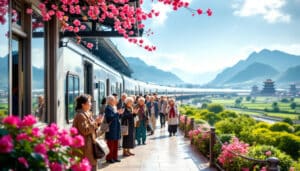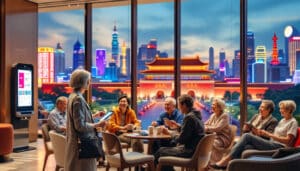Welcome to the digital universe where every click counts.
Your online experience is shaped by invisible yet crucial elements.
Let’s discover together how cookies and data transform your browsing.
We use cookies to provide and maintain Google services, thus ensuring optimal performance. These small files allow us to track interruptions and protect your experience against spam, fraud, and abuse. By measuring our audience’s engagement and site statistics, we better understand how our services are used and can therefore improve their quality. Depending on your choices, we also tailor content and advertisements to make them more personalized and relevant.

“`html
The emergence of educational tourism for seniors: why is this trend booming?
The educational tourism for seniors is experiencing growing popularity, reflecting a significant transformation in the silver economy. This trend responds to an increased demand from older adults seeking to enrich their knowledge while traveling. Seniors, often having more free time and financial resources, now wish to combine leisure and learning. This convergence of needs has paved the way for a new tourism offering centered on various educational programs, ranging from artistic workshops to historical lectures.
Moreover, the aging of the global population has encouraged businesses in the tourism sector to adapt their offerings. According to a recent study, the senior segment represents an expanding market, with a willingness to actively participate in cultural and educational activities during their travels. This dynamic is also supported by government initiatives aimed at promoting the well-being of older adults, including continuing education and personal development programs.
Furthermore, the rise of digital technologies facilitates access to educational resources even from a distance, allowing seniors to plan and personalize their educational trips with great flexibility. Online platforms now offer thematic itineraries, virtual guided tours, and training modules tailored to the specific needs of seniors. This increased accessibility helps strengthen the attractiveness of educational tourism, providing enriching experiences suited to this age group.
What are the benefits of educational tourism for seniors?
Educational tourism offers numerous benefits to seniors, both intellectually and socially. Participating in educational activities during trips not only allows for acquiring new knowledge but also helps maintain stimulating cognitive activity. This stimulation is essential for preventing cognitive decline associated with aging and contributes to a better quality of life.
Socially, educational tourism promotes intergenerational and intercultural interactions. Seniors have the opportunity to meet like-minded individuals, exchange ideas, and forge lasting bonds. These interactions enhance the sense of belonging and reduce social isolation, which is often encountered by older adults.
Physically, many activities offered within educational tourism, such as walking guided tours, cooking workshops, or dance classes, encourage light but regular physical activity. This contributes to maintaining good physical condition and promoting an active lifestyle, essential for the overall well-being of seniors.
Finally, educational tourism offers an enriching emotional dimension. Exploring new horizons, discovering different cultures, and learning new skills fosters a sense of accomplishment and boosts self-esteem. These positive experiences have a lasting impact on mental health and happiness among seniors.
How does educational tourism integrate into the silver economy?
The integration of educational tourism into the silver economy manifests through the adaptation of offerings and services to meet the specific needs of seniors. Businesses in the tourism sector are developing tailored programs, including suitable educational activities, comfortable accommodations, and personalized services. This approach helps attract a senior clientele seeking enriching and secure experiences.
Moreover, public policies support this integration through subsidies and initiatives to promote tourism accessible to older adults. Partnerships between public agencies and private stakeholders enable the creation of diverse and quality offerings, thereby facilitating access to educational tourism for seniors.
Additionally, the silver economy benefits directly from this trend due to the increased spending dedicated to educational tourism. Seniors, often possessing stable incomes and saving capabilities, invest in quality trips, generating revenue for local businesses and contributing to the economic growth of tourist destinations. This dynamic creates a virtuous cycle where educational tourism strengthens the silver economy, and vice versa.
Furthermore, the evolution of mindsets toward a more inclusive and respectful society for seniors encourages businesses to innovate and diversify their offerings. This innovation is driven by the growing demand for educational and personalized travel experiences, thus facilitating the transformation of the silver economy into a more dynamic and resilient economy.
What are the key destinations for educational tourism for seniors?
Several destinations stand out in the field of educational tourism for seniors, thanks to their rich and diverse offerings. Among them, Hong Kong distinguishes itself with its new initiative focused on the silver economy, offering educational programs specifically designed for seniors. These initiatives allow visitors to discover local history and culture through interactive workshops and thematic guided tours. To learn more, check out this article.
China is also an essential destination, with the launch of coupons aimed at boosting the senior economy and encouraging cultural and tourist spending. These measures facilitate access to a variety of educational and cultural activities, making travel more appealing for seniors. Discover the details in this article.
Arab countries also offer unique opportunities for educational tourism. Each year, thousands of seniors are attracted by the economic, financial, and political riches of the region, participating in seminars and institutional visits. For an in-depth analysis, consult this article.
Other notable destinations include countries in Europe and North America, where educational programs for seniors are well-established and continually evolving. These regions offer a wide variety of activities, ranging from language courses to cultural excursions, thus meeting the diverse expectations of senior travelers.
What challenges does educational tourism for seniors face and how to overcome them?
Despite its numerous advantages, educational tourism for seniors presents several challenges that need to be addressed to ensure its success and sustainability. One of the main obstacles is the physical accessibility of destinations and tourism infrastructures. It is crucial to develop suitable infrastructure, such as accessible accommodations, comfortable transportation, and tourist sites equipped to meet seniors’ needs.
The language barrier also represents a significant challenge, especially in international destinations. Offering multilingual services and guides trained to communicate with seniors can greatly enhance the travel experience. Furthermore, developing bilingual educational programs or those in the participants’ native language facilitates learning and engagement.
Another challenge concerns the safety and health of seniors while traveling. It is essential to provide detailed information about available healthcare at destinations, as well as suitable insurances. Organizers of educational trips must also ensure that all activities are designed taking into account the physical abilities and possible health issues of participants.
Finally, cost can be a barrier for some seniors. Offering financing options, special discounts, and flexible programs can make educational tourism more accessible. Encouraging partnerships with financial institutions and senior organizations can also help provide attractive economic solutions.
To ensure the success and sustainability of educational tourism for seniors, it is vital to adopt a holistic approach that integrates accessibility, safety, diversity of offerings, and inclusivity. By overcoming these challenges, the sector can continue to grow and meet the aspirations of seniors seeking learning and discovery.
How are innovative technologies transforming educational tourism for seniors?
The integration of innovative technologies is revolutionizing the landscape of educational tourism for seniors. Digital advancements offer new possibilities for enriching the travel experience by making learning more interactive and accessible. For instance, dedicated mobile apps enable seniors to plan their educational itineraries, access educational content in real-time, and participate in virtual guided tours.
Augmented reality (AR) and virtual reality (VR) are also used to create immersive experiences. These technologies allow senior travelers to explore historical or cultural sites interactively, providing detailed reconstructions and enriched information. These tools foster a deeper understanding of the subjects studied and make learning more engaging.
Moreover, online platforms facilitate the creation of virtual communities where seniors can exchange ideas, share experiences, and collaborate on educational projects. These interactions enhance the sense of belonging and encourage continuous learning even after returning from the trip.
Finally, the use of advanced communication technologies allows for online conferences and seminars accessible from anywhere in the world. These hybrid formats combine the best of both worlds, offering flexibility and accessibility while maintaining a high level of interaction and engagement.
What are the economic impacts of educational tourism for seniors?
Educational tourism for seniors has significant economic repercussions, both for tourist destinations and for businesses in the sector. By attracting a population with substantial financial means, these programs generate substantial revenues and contribute to the creation of local jobs. Seniors often rely on quality services, which encourages providers to improve their offerings and invest in adequate infrastructures.
Furthermore, educational tourism promotes the economic diversification of tourist regions. By integrating educational and cultural activities, destinations can attract a varied clientele, thus reducing their dependence on traditional tourist flows alone. This diversification strengthens economic resilience against fluctuations in the tourism market.
The economic benefits also extend to related sectors such as dining, retail, and transportation. By hosting seniors seeking educational experiences, these sectors benefit from increased demand and can develop new tailored offerings to meet the expectations of this clientele.
Finally, educational tourism stimulates innovation and competitiveness in the sector. Businesses are encouraged to develop innovative programs, adopt new technologies, and improve the quality of their services to stand out in the market. This dynamic fosters sustained growth and continuous improvement of tourism offerings.
What are the testimonials of seniors who have participated in educational tourism?
Testimonials from seniors who have participated in educational tourism highlight its many benefits and positive impact on their lives. Marie, 68, shares her experience: “Participating in an educational trip allowed me to discover new cultures and learn things I never imagined. It’s a rewarding way to spend my retirement while continuing to learn.”
Jean-Pierre, 72, adds: “Educational tourism offered me the opportunity to meet like-minded people and create lasting friendships. The activities provided were perfectly suited to my needs and allowed me to thrive intellectually.”
Claire, 65, also testifies: “Thanks to educational tourism, I was able to participate in workshops on local cuisine and historical lectures that made my trip much more meaningful. It’s an experience I highly recommend to all seniors wanting to combine pleasure and learning.”
These testimonials illustrate the importance of educational tourism in the lives of seniors, offering them enriching, social, and intellectual experiences, while also contributing to their overall well-being.










